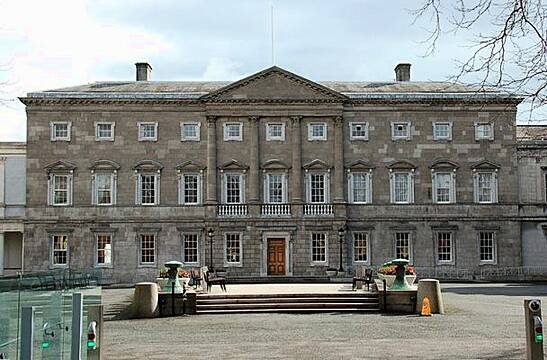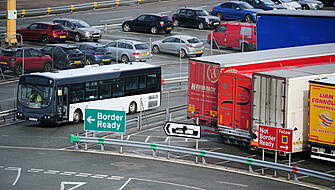Almost two-thirds of Irish people believe men are treated better in politics than women, while just under half believe that feminism has “gone too far".
The findings are contained in a new report published by the European Commission on attitudes to gender stereotypes across the EU.
The results of the EU-wide survey reveal that 64 per cent of Irish respondents stated their belief that males are treated better in politics than women – the third highest rate among the 27 EU member states where the average rate was 54 per cent.
Only 6 per cent of Irish people thought female politicians were treated better than male ones.
The report also showed that 47 per cent of Irish people believe that feminism has “gone too far” including 18 per cent who totally agreed with such a sentiment.
A majority of citizens in eight EU countries also held such a view including France and Spain.
The Irish rate of dissatisfaction with the advancement of feminism was just above the EU average of 45 per cent.
The Eurobarometer poll, of over 26,600 adults across the EU member over 1,000 in the Republic, was carried out to provide an overview of the perception of gender stereotypes across various contexts including the household, work, politics and leadership positions.
The findings show Europeans tend to reject many common gender stereotypes, although exceptions still exist and a tendency to stereotype is still present among a sizeable proportion.
For example, although majorities disagree that the most important role of a man is to earn money and of a woman is to take care of her home and family, around 4 in 10 Europeans including Irish people still agree with these statements.
The findings were mixed when it came to perceptions of gender roles within the household.
An overwhelming majority of Irish people agree that it is important for women and men to be financially independent (92 per cent) and that taking parental leave is enriching for a father (84 per cent).
A large proportion also disagree that men should have the final say for important family decisions (81 per cent).
Slimmer majorities disagreed that having children is more fulfilling for a woman than a man (53 per cent) and agree that if a father’s pay is lower than that of the mother, he is the one who should give up work to look after the children if a family decides that one parent has to do so (56 per cent).
Some stereotypical views about the division of roles in the household still persist with 51 per cent of all Europeans and 41 per cent of Irish respondents believing that, all in all, family life suffers when the mother has a full-time job.
Household chores
Opinion is similarly divided on whether men are naturally less competent than women in performing household tasks.
In Ireland 45 per cent agreed that men were less competent at household chores than women but 52 per cent disagreed.
Most Europeans including Irish people reject gender stereotypes relating to professional work with 58 per cent of Irish respondents disagreeing that women should give priority to their family responsibilities over their career, although 34 per cent agreed with such a view – the same rate as the EU average.
Similarly, 8 out of 10 Irish people disagreed that men taking parental leave demonstrated some sign of lack of career ambition, while 83 per cent disagreed that women were not ambitious enough to get more senior job roles.
However, Irish people are split almost evenly on whether women have the same chances of getting promoted as men with 49 per cent believing they do, while 47 per cent think the opposite.
On gender stereotyping in politics, the results overall were positive with large majorities rejecting the statement that women were less interested than men in positions of responsibility in politics – 64 per cent in Ireland.
In a similar fashion, 84 per cent of Irish people disagreed that women do not have the necessary qualities and skills for senior roles in politics, while 79 per cent disagreed that women in leadership positions do not show the necessary authority to be taken seriously and 81 per cent disagreed that they were too emotional to be good leaders.
Conversely 73 per cent of Irish respondents believe that having more women in politics leads to better policy decisions with 58 per cent believing temporary measures like quotas are necessary to overcome the existing under representation of women in politics.
The report was published just after the recent general election in Ireland which showed that the number of female TDs is still less than a quarter of all members elected to the new enlarged Dáil.
Gender quotas
Although there was a record number of 246 female candidates in last month’s election due to the gender quota for political parties, the number of women elected TDs was 43 –up slightly to 24.7 per cent of all successful candidates compared to 23.1 per cent in the previous Dáil.
The report acknowledged that the EU has made significant progress in gender equality in recent decades with encouraging trends including the higher number of women in the labour market and their progress in securing better education and training.
However, it added: “While the gender gap in education is being closed and is actually negative for several indicators, gender gaps in employment, pay, care, power and pensions persist.”

The European Commission said one of the key objectives of its Gender Equality Strategy 2020-2025 was to challenge gender stereotypes which it claims is “a root cause of gender inequality and affects all areas of society.”
While the overall results present a positive picture, the report said the findings are more nuanced when broken down between member states with wide gaps between the highest and lowest figures in agreement on each issue related to gender stereotyping.
It observed that men are also more inclined than women to stereotype based on gender, while the gap in perceptions between men and women is more pronounced among younger age groups than older people.
“In most cases, this is due to a closer alignment of youngest men’s attitudes with those of older men than with those of their female age peers,” it added.







